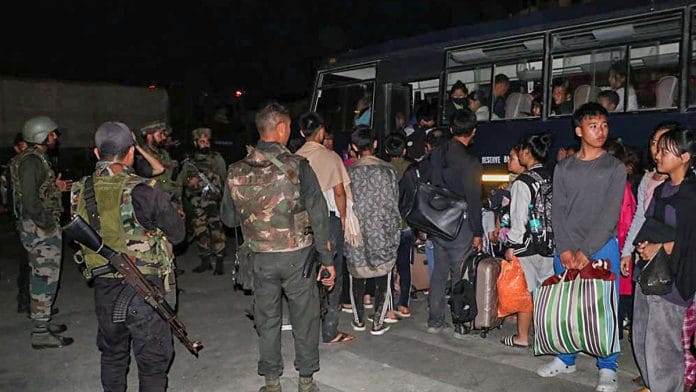The situation in Manipur appears to be returning to normality, which is good news. The state government is being aided by the Army in controlling the situation. But taking the Army’s help on such sensitive issues and areas for long may become counterproductive. Hence, it is advisable that the Army is withdrawn from Manipur at the earliest.
The Scheduled Tribes Demand Committee (STDCM) has said it will continue and intensify the demand for inclusion of the Meitei community in the ST list. The Tribal Solidarity March, a hurriedly cobbled umbrella outfit of some hill tribes, appears determined to oppose the demands by the Meitei community, which increases the chances of further social unrest.
A prolonged situation of unrest in a border state, infamous for being home to several insurgent groups, is a serious threat to security. This will also seriously impact economic and developmental activities being undertaken by the Union government as part of the Look East, Act East policy. Also, anti-social elements will add fuel to the fire and vitiate the atmosphere leading to further schism in the already fragmented social milieu.
The entire Northeast, the entry point to East and Southeast Asia and rendered landlocked due to Partition in 1947, has as little as one percent border connection with the rest of the country through the Siliguri Corridor. The rest of the Northeast has borders with Nepal, Bhutan, Myanmar, Bangladesh, and Tibet. The Union government should step in and resolve the issue before the parties to the conflict regroup for another round of confrontation and violence.
Also read: ‘What if it happens again?’ No violence in 5 days, but distrust grips Manipur, fear haunts victims
Common fears
According to media reports, violent clashes broke out in Manipur following the ‘Tribal Solidarity March’, which was organised in the ten hill districts on 3 May to protest the Meitei community’s demand for Scheduled Tribe (ST) status. For more than a decade, the predominantly Hindu Meitei community, which accounts for about 42 percent of the state’s population as per the 2011 Census, has been demanding ST status, arguing that it would help protect their ancestral land, age-old customs and traditions, and safeguard their unique identity. Since the Meitei customs are more or less similar to and as ancient as that of the hill tribes, there is no reason to prevent their inclusion into the ST status.
The Manipur High Court, through its 27 March order, directed the state government to “consider the case of the petitioner for inclusion of the Meetei/Meitei community in the Scheduled Tribe list expeditiously, preferably within a period of four weeks”. The inclusion involves a cumbersome process. The state government has to submit a recommendation to the Union Tribal Affairs Ministry, which will write to the Office of the Registrar General of India (ORGI). The proposal for inclusion of Meitei in the ST list will then go to the Union Cabinet through the National Commission for Scheduled Tribes for amending the Constitution (Scheduled Tribes) Order 1950.
The hill tribes are apprehensive that granting ST status to the ‘majority’ Meitei tribe will rob smaller tribes of job opportunities by eating into the percentage reserved for them. As it is, employment opportunities are scarce in a landlocked state like Manipur.
Also read: TV news won’t show you Manipur violence. But it has all the space for PM, The Kerala Story
Religious conflict?
Besides the tribal differences, religious groups and institutions also appear to be playing an active role in fanning conflicting groups. The 3rd May demonstration was supported by the All Tribal Students’ Union, a Christian outfit consisting of the Kuki tribe. While some church leaders argue that the ‘religious dimension of the conflict should not be discounted’, the emeritus archbishop of Guwahati in Assam has blamed the religious dimension to the “polarised atmosphere created by the majoritarian Hindutva regime at the national level”. Saner elements in the Christian community should impress upon the clergy not to turn this conflict into a Hindu-Christian conflict and play the victim card.
A section of the ‘Hindu’ Meitei leadership has accused some church leaders in the hills of being responsible for the opposition. They argue that while non-tribals cannot buy property in tribal areas due to protection guaranteed by Article 371 of the Constitution, the tribals can settle in the Meitei-dominated valley lands. The government can consider extending the provisions of Article 371 to all of Manipur, as has been done in Himachal Pradesh, to allay the fears of the Meitei community.
Additionally, the central government and the Northeast Development Council should initiate infrastructure and connectivity projects, facilitate small and medium scale non-polluting industries, and improve education and healthcare facilities. Too much is at stake in the Northeast and further neglect will be bad news for the $5 trillion agenda of the central government.
Seshadri Chari is the former editor of ‘Organiser’. He tweets @seshadrichari. Views are personal.
(Edited by Prashant)






